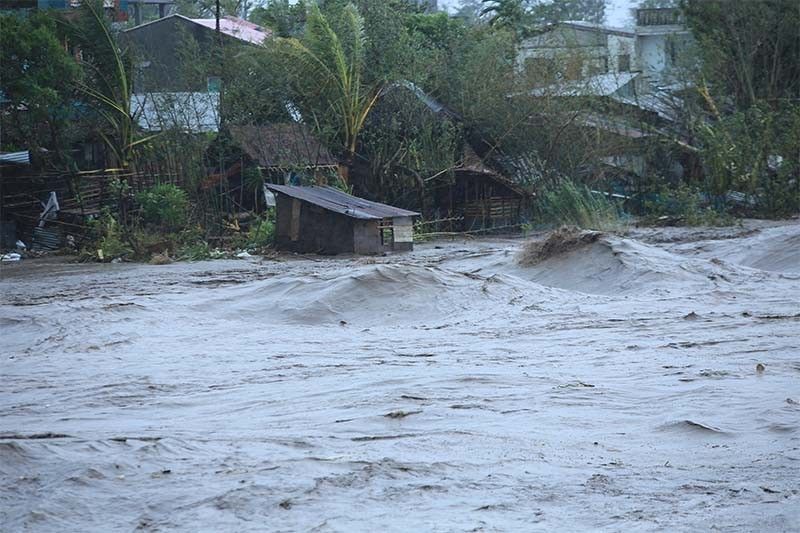Commentary: COVID-19 and climate change, the dual crises of 2020

There is no doubt that people will remember 2020 as the year the world was introduced to COVID-19, the virus behind the global pandemic that has led to over 1.8 million deaths, caused economies to crash, and opened doors to corruption around the world.
In the Philippines, COVID-19 cases have been steadily rising and now stand at 473,532 with over 9,000 deaths. The public health crisis and the lockdowns implemented to slow its spread also took an economic toll, with the Philippine economy entering a technical recession mid-year.
The emergency use of public funds to respond to the health crisis has also pushed transparency to the back burner. As noted by Stratbase ADR Institute Trustee Dr. Francisco Magno in his recently published Special Study entitled "Reviving democratic institutions: Strengthening the fight against corruption," ever since the start of the pandemic, state-based responses have been marked by fund movement possessing three key traits.
These are: 1) large, 2) unclear in beneficiaries and usage, and 3) with high discretion. Indeed, this health crisis has created the opportunity for COVID-corruption which cripples our government's capacity to respond to the health crisis adequately.
At the same time, 2020 was also a big year for the global fight against climate change. In line with the Paris Agreement in 2015, signatory countries were due to publish their revised climate action plans, or nationally determined contributions, to coincide with COP26 in Glasgow. It was supposed to be the first real test for the signatory countries but was postponed due to the pandemic.
Meanwhile, the effects of climate change continue to be felt. The Philippines was reminded of these destructive effects late last year when Super Typhoon Rolly and Typhoon Ulysses claimed lives, left thousands homeless, and damaged agriculture and infrastructure.
Truly, the past year was one where we faced the dual crises of COVID-19 and climate change, and while they are two distinct issues, there are lessons that we can take from what these crises have in common.
Allow me to highlight just three.
The first is how both crises are security threats that need more national attention. As recently pointed out by Dr. Renato de Castro, a trustee and program convenor of the Institute, challenges brought about the climate change and public health crises are examples of non-traditional security issues that need to be factored into our security agenda.
In his study entitled "The Challenge of Managing 21st Century Pandemics Amidst the US-China Strategic Competition," De Castro explained that non-traditional security threats are those that challenge the well-being of people and states, but that arise primarily out of non-military and non-strategic sources.
He also pointed out the need to shift how people perceive what threatens our security from strictly military, political and diplomatic conflicts to include non-traditional security threats, such as those that can be brought about by climate change and emerging infectious diseases (EIDs).
The second thing these two crises have in common is how both highlight just how pivotal the whole-of-society approach is to our climate change and pandemic responses.
During a virtual town hall discussion organized in the middle of last year on mitigating the impact of COVID-19 through sustainable health financing, Dr. Liza Martinez of the Philippine Alliance of Persons with Chronic Illness, pointed out that "participation is very key to us... COVID-19 related, as well as non-COVID-19 related health concerns, must be factored into the picture. The weakest link of any national issue will determine the outcome of success."
The private sector and civil society's efforts throughout the pandemic demonstrate their willingness to participate and contribute to the success of the country’s response efforts.
From vigilance against COVID-corruption, to raising funds to help frontliners and poor communities, to building-up the country's testing capacity through the public-private initiative taskforce T3 (Test, Trace, Treat), to committing to help the government secure vaccine doses, the private sector and civil society have shown just how vital their role is in Philippine society.
In terms of combating climate change, multi-sectoral collaboration, too, was central to the discussion of our Pilipinas Conference 2020 session on the green economic recovery. The session had speakers from the private sector, such as Coca-Cola, Ayala Corp. and the Chamber of Mines of the Philippines, talking about the importance of the private sector taking initiative to be sustainable and responsible stewards of the environment.
At the same time, Manila Mayor Isko Moreno was there too and emphasized the point on collaboration and climate change and said that if "private corporations will work hand in hand with the government, we will achieve our goals in protecting our environment and creating sustainable programs for the next generation."
The third takeaway from these dual crises is that we now have an opportunity to improve. Coming off of year shaped by COVID-19 and climate change, one of the most significant challenges now is to "build back better."
However, this means doing more than getting the economy back on track. What people build must reduce the likelihood of future shocks and increase society's resilience when they occur.
The "new normal," a term I wished we could leave in 2020, should be a pro-active one. One where climate change and EIDs are seen as serious threats to our country's security and are planned against accordingly.
Given the growing awareness of the relationship between environmental destruction and new diseases, it must also be a collaborative one, where the government, private and civil society sectors work together to generate economic and social value through greener initiatives.
They say that hindsight is 20/20. Hopefully, this means that we have learned a few things from the year that passed and — fully knowing that the risks we faced then in terms of public health, COVID-corruption, and climate change are by no means behind us — march into 2021 armed with hope and lessons learned.
Paco Pangalangan is the executive director of think tank Stratbase ADR Institute.
- Latest
























